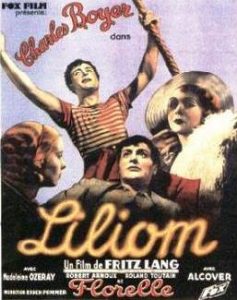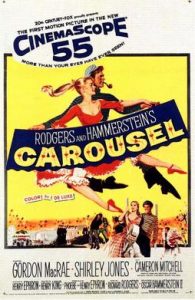Wednesday Double Feature – Liliom
As a lover of Broadway Musicals, having grown up on my grandfather’s Rodgers and Hammerstein collection, I was aware of one of their lesser-known plays, Carousel. I had always had mixed feelings about it. It had piqued my interest because it took place in Boothbay, Maine, a town that is just fifteen minutes away from where I used to spend my summers growing up. But because it was one of Rogers and Hammerstein’s darker plays, involving the protagonist committing suicide I never watched it beyond the first act. But I always liked the soundtrack.
In the meantime, I learned It was based on Ferenc Molnár’s play, Liliom. I also learned that while people know of Carousel, very few knew about Liliom.
This is what we call a challenge.
So here for this week, I watched different versions of Liliom.
 For the first film, I watched was Fritz Lang’s Liliom, his only French film that he did on his way to Hollywood, running away from the Nazis.
For the first film, I watched was Fritz Lang’s Liliom, his only French film that he did on his way to Hollywood, running away from the Nazis.
Charles Boyer plays Liliom a barker for a carousel. He falls in love with and married a chambermaid named Julie( Madeleine Ozeray)However since he’s a lazy self-important wastrel, things go badly with both of them unemployed and destitute. In desperation, Liliom participates in a robbery, which he and his accomplice fail at. Liliom kills himself. He finds himself in purgatory but is allowed to return to earth for one day to try and make amends.
I had mixed feelings about this film. While I certainly consider Lang one of the greatest pioneers of film, this film was certainly not one of his masterpieces. But Boyer is very good playing Liliom as an arrogant, self-destructive jerk.
I especially liked the similarity between the police station Liliom is sent to, earlier in the film, to the bureaucratic afterlife he finds himself in.
 The next film on my list was Henry King’s adaptation of Carousel. Carousel is nearly identical to the original play, except that Liliom becomes Billy Bigalow (Gordon MacRae) and 19th century Budapest is replaced with 19th century Maine.
The next film on my list was Henry King’s adaptation of Carousel. Carousel is nearly identical to the original play, except that Liliom becomes Billy Bigalow (Gordon MacRae) and 19th century Budapest is replaced with 19th century Maine.
I was pretty disappointed with this film. Because I’ve listened to the soundtrack so many times I couldn’t help but be annoyed by how much they cropped one of Rodger and Hammerstein’s most complex scores (It doesn’t help that Macrae’s singing ability does not even come close to the chops to carry one of the closest things Rodger and Hammerstein ever got to straight opera)
On top of this, this film feels like a checklist of how not to do a film adaptation of a musical. Never really taking advantage of the potential of film, even when shooting outdoors! This is most apparent in the dance numbers. They’re not technically bad, but it’s like the King and his choreographer never spoke. So despite there being what would have been great in the theater are completely ruined by the camera shots.







It looks like the comment log-in problem has been fixed, and your statement about Gordon MacRae’s singing ability makes sense (and I agree with it), and may be why the song Highest Judge of All was left out. While not my favorite musical (that would be Music Man), I retain fond memories of seeing Carousel on the stage of the local Summer Music Theatre where I worked as a lad of but 15 summers, and it does have some fine music in it.